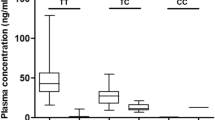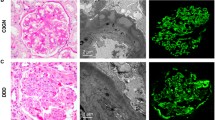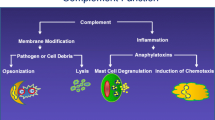Abstract
Background: Complement factor H (CFH; HF) is an essential regulatory protein that plays a critical role in the homeostasis of the complement system in plasma. Several polymorphisms and mutations in the complement factor H gene (CFH; HF1) have been identified. These have revealed interesting associations with hemolytic-uremic syndrome and age-related macular degeneration.
Methods and Results: The aim of this study was to develop a rapid and reliable assay for determining genotypic variants of the CFH gene. Sequence-specific primer PCR and restriction fragment length polymorphism techniques were chosen for the analysis of CFH polymorphisms. The assays detected the following published single nucleotide polymorphisms of CFH in our Caucasian population (n = 271): rs800292, 257G→A (V62I); rs1061170, 1277T→C (Y402H); and rs1065489, 2881G→T (E936D). The allele frequencies (257G = 0.850, 1277T = 0.574, and 2881G = 0.839) that we obtained from a healthy Hungarian population were consistent with previously published results.
Conclusion: These analytical methods are simple, reliable, and rapid to perform, and are amenable to automation. Therefore, they could facilitate large-scale genotypic analyses of the CFH gene in various diseases, such as hemolytic-uremic syndrome, age-related macular degeneration, and cardiovascular diseases.







Similar content being viewed by others
References
Zipfel PF, Hellwage J, Friese MA, et al. Factor H and disease: a complement regulator affects vital body functions. Mol Immunol 1999 Mar–Apr; 36(4–5): 241–8
Ripoche J, Day AJ, Harris TJ, et al. The complete amino acid sequence of human complement factor H. Biochem J 1988 Jan 15; 249(2): 593–602
Weiler JM, Daha MR, Austen KF, et al. Control of the amplification convertase of complement by the plasma protein beta1H. Proc Natl Acad Sci U S A 1976; 73: 3268–72
Ross GD, Lambris JD, Cain JA, et al. Generation of three different fragments of bound C3 with purified factor I or serum (I): requirements for factor H versus CR1 cofactor activity. J Immunol 1982 Nov; 129(5): 2051–60
Kuhn S, Skerka C, Zipfel PF. Mapping of the complement regulatory domains in the human factor H-like protein 1 and in factor H1. J Immunol 1995 Dec 15; 155(12): 5663–70
Rodriguez de Cordoba S, Lublin DM, Rubinstein P, et al. Human genes for three complement components that regulate the activation of C3 are tightly linked. J Exp Med 1985 May 1; 161(5): 1189–95
Weis JH, Morton CC, Bruns GA, et al. A complement receptor locus: genes encoding C3b/C4b receptor and C3d/Epstein-Barr virus receptor map to 1q32. J Immunol 1987 Jan 1; 138(1): 312–5
Rodriguez de Cordoba S, Diaz-Guillen MA, Heine-Suner D. An integrated map of the human regulator of complement activation (RCA) gene cluster on 1q32. Mol Immunol 1999 Sep–Oct; 36(13–14): 803–8
Zipfel PF, Jokiranta TS, Hellwage J, et al. The factor H protein family. Immunopharmacology 1999 May; 42(1–3): 53–60
Zipfel PF, Skerka C. Complement factor H and related proteins: an expanding family of complement-regulatory proteins? Immunol Today 1994 Mar; 15(3): 121–6
Rodriguez de Cordoba S, Esparza-Gordillo J, Goicoechea de Jorge E, et al. The human complement factor H: functional roles, genetic variations and disease associations. Mol Immunol 2004 Jun; 41(4): 355–67
Caprioli J, Peng L, Remuzzi G. The hemolytic uremic syndromes. Curr Opin Crit Care 2005 Oct; 11(5): 487–92
Caprioli J, Bettinaglio P, Zipfel PF, et al. The molecular basis of familial hemolytic uremic syndrome: mutation analysis of factor H gene reveals a hot spot in short consensus repeat 20. J Am Soc Nephrol 2001 Feb; 12(2): 297–307
Perez-Caballero D, Gonzalez-Rubio C, Gallardo ME, et al. Clustering of missense mutations in the C-terminal region of factor H in atypical hemolytic uremic syndrome. Am J Hum Genet 2001 Feb; 68(2): 478–84
Richards A, Buddies MR, Donne RL, et al. Factor H mutations in hemolytic uremic syndrome cluster in exons 18–20, a domain important for host cell recognition. Am J Hum Genet 2001 Feb; 68(2): 485–90
Warwicker P, Goodship TH, Donne RL, et al. Genetic studies into inherited and sporadic hemolytic uremic syndrome. Kidney Int 1998 Apr; 53(4): 836–44
Klein RJ, Zeiss C, Chew EY, et al. Complement factor H polymorphism in agerelated macular degeneration. Science 2005 Apr 15; 308(5720): 385–9
Edwards AO, Ritter R, Abel KJ, et al. Complement factor H polymorphism and age-related macular degeneration. Science 2005 Apr 15; 308(5720): 421–4
Haines JL, Hauser MA, Schmidt S, et al. Complement factor H variant increases the risk of age-related macular degeneration. Science 2005 Apr 15; 308(5720): 419–21
Zipfel PF, Skerka C, Caprioli J, et al. Complement factor H and hemolytic uremic syndrome. Int Immunopharmacol 2001 Mar; 1(3): 461–8
Saunders RE, Goodship TH, Zipfel PF, et al. An interactive web database of factor H-associated hemolytic uremic syndrome mutations: insights into the structural consequences of disease-associated mutations. Hum Mutat 2006 Jan; 27(1): 21–30
Caprioli J, Castelletti F, Bucchioni S, et al. Complement factor H mutations and gene polymorphisms in haemolytic uraemic syndrome: the C-257T, the A2089G and the G2881T polymorphisms are strongly associated with the disease. Hum Mol Genet 2003 Dec 15; 12(24): 3385–95
Hageman GS, Anderson DH, Johnson LV, et al. A common haplotype in the complement regulatory gene factor H (HF1/CFH) predisposes individuals to age-related macular degeneration. Proc Natl Acad Sci U S A 2005 May 17; 102(20): 7227–32
Ying L, Katz Y, Schlesinger M, et al. Complement factor H gene mutation associated with autosomal recessive atypical hemolytic uremic syndrome. Am J Hum Genet 1999 Dec; 65(6): 1538–46
Zee RY, Diehl KA, Ridker PM. Complement factor H Y402H gene polymorphism, C-reactive protein, and risk of incident myocardial infarction, ischaemic stroke, and venous thromboembolism: a nested case-control study. Atherosclerosis 2006 Aug; 187(2): 332–5
Altschul SF, Gish W, Miller W, et al. Basic local alignment search tool. J Mol Biol 1990 Oct; 215(3): 403–10
European Bioinformatics Institute. ClustalW submission form [online]. Available from URL: http://www.ebi.ac.uk/clustalw/ [Accessed 2006 Aug 16]
Acknowledgments
This work was supported by the National Office for Research and Technology, and the National Research Fund (grant number T46837).
The authors have no conflicts of interest that are directly relevant to the content of this article.
Author information
Authors and Affiliations
Corresponding author
Rights and permissions
About this article
Cite this article
Bíró, A., Prohászka, Z., Füst, G. et al. Determination of Complement Factor H Functional Polymorphisms (V62I, Y402H, and E936D) using Sequence-Specific Primer PCR and Restriction Fragment Length Polymorphisms. Mol Diag Ther 10, 303–310 (2006). https://doi.org/10.1007/BF03256205
Published:
Issue Date:
DOI: https://doi.org/10.1007/BF03256205




